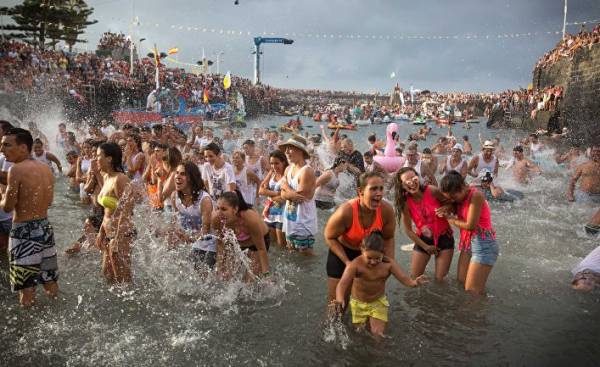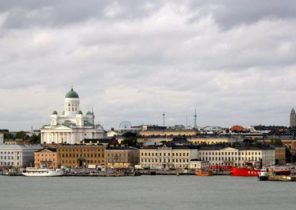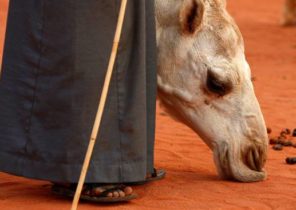
Interview with orientalist, geographer and scholar Paul Cywinski
— Krytyka Polityczna: Modern tourists carry with them a neo-colonialism?
— Paul Cywinski (Paweł Cywiński): In a sense, Yes. The term “tourist neo-colonialism” is used in discussions on tourism since the 1980-ies and describes the relationship between the world of tourists and world of the inhabitants of a specific country or region, which depends on either the tourist industry or exposed to pressure.
— In which case we can talk about addiction?
For example, when a region or nation come so many tourists that the share of income from tourism is 20% GDP. Quite some event (terrorist attack, an environmental or natural disaster, or just drop in demand for this direction), and the number of guests is reduced, and the state plunged into economic crisis. The tourism industry in these circumstances has to make considerable concessions, for example, to pay the carriers. Imagine that any major European airline decides to abandon flights to the Maldives. In this small, tourism dependent countries will have no choice but to pay the airline.
— How does the oppression of the local inhabitants?
— It manifests itself in very different ways. Several years ago I conducted research in Indonesia, particularly in the largest Buddhist temple complex of Borobudur world. It would seem that Buddhists should be masters there. Meanwhile, they make there own group rituals only once a year. And to visit the Shrine alone, they have as tourists to buy a ticket. The complex converted into a Museum, it has almost lost its religious role. Visitors may learn about the great work that has been invested in its restoration, architectural style, but almost nothing to say about religion. This is a classic example of oppression of local residents, owners, who gave the tourism industry something that played a major role. There are many such examples.
— How does this reality “postures”?
— The prefix “post” contains a reference to the critical, analytical beginning. On the one hand, we need to think about where we’re going to go, to learn about its history, culture, political and social situation, the status of the tourism industry. On the other — to think about their role in this reality and its formation of how we perceive the people of this country. Postures is a man who reflects on his role in the world, on how he looks as a tourist. Become fully picturescom can not be only at certain points to act as postures. Complex structure of the modern world does not allow us to be heroes constantly ambiguous from the point of view of moral situations to avoid will not work.
— That is, ethical tourism does not exist.
— Fully ethical — no, it is a utopia. However, utopias are beautiful, they describe the unattainable goal, striving for which it is possible to achieve success. Tourism is also working. We will likely not change the world or the tourism industry, but there is a chance that we will be able to do some good on a local scale or even to avoid something that will lead to negative consequences.
Imagine you’re in a poor Asian country. You know how much money earned on tourism, leaving it abroad, and want to make more money is left in this state. You decide to not staying in larger hotels, which belong to the foreign networks and small hotels, located in the less popular tourist areas. Most likely, the money will actually remain in the country. On the other hand, it should be understood that in environmental terms these places is a nightmare. From the point of view of infrastructure, access to electricity and deep waters, the use of which reduces the level of groundwater or leads to their pollution, these places look real environmental bomb compared to resorts ready to cater for the mass tourism industry. In the moment when you are thinking about it, you become pastorista.
— Why postures will begin preparations for the journey to Laos, about which he knows nothing?
— First of all he will try to learn more about the place that is going to visit, using sources from that country, “not to deprive the words” its inhabitants. He can listen to Lao music and watch youtube clips local, find a book written by loscam, to study the materials on the website of the Lao Ministry of tourism. Most important to treat residents seriously: allow them to speak, to tell about their history, about what they want to show us what is important to them, what they care about.
Tourism characteristic “to plug the throat” to the local population, even the poles. When a Brit is going to visit our country, he draws the information in the sources created outside of Poland. It is usually the commercial resources that tend not to give us the true knowledge and to draw a real image of a state, but simply to make money.
— The voices of local residents we don’t hear even when you arrive at the scene. Our contacts with them, especially in countries with exotic culture for us is limited. Even if we leave from the hotel, where we have “all inclusive”, my interest, curiosity and sometimes fear of watching people, photographing them, taking photo stealthily, but very rarely come into any contact.
Modern global tourism creates “antistrike” with a foreign culture. There are observers and objects of observation, and between them is the huge economic, social and cultural gap. People living in tourism perceive immigrants as “walking ATM”. Tourists, in turn, do not seek to initiate dialogue and often look at the locals like animals in a zoo. They can take pictures on the sly, or, conversely, to show off the flash right in the face without asking permission. It has become the norm. In my country we would do not have. We’re going to an exotic country and suddenly the behavior that we repent invalid home, it becomes normal for us.
Another phenomenon that hinders better contacts is orientalizing the inhabitants of exotic countries and semioriental. Very often the locals follow the stereotypes that exist about them: they artificially emphasize cultural differences, trying to match the image that presents itself to the tourist. Perhaps every woman who was in any Arab country, I heard an offer to trade her for some camels, while most North African States from such transactions have been abandoned long ago.
— There is a demand, there is offer. One party pays the other, so that she played the role of the savage with a spear. The first will boast of the familiar photographs, and the second — to existence. They function, for example, all ethnic village in Ethiopia or Kenya. This phenomenon can be best. In South Africa, some ethnic groups was thus able to assert themselves and gain financial independence, becoming regional players in negotiations with the government about their status and their lands.
It should, however, be aware that our travel fantasies is the fruit of the labors of magazines, guidebooks, television programs, and on the basis of the fantasies, in turn, generated expectations. In the tourism industry expectations are in the first place. They need to be able to create, and then to meet in order to earn.
— Back to the moral dilemmas. One day, along with other tourists I rode the bus past the Moroccan villages, on the way we stopped to hand out gifts to local children. Everyone can feel like a Madonna in Malawi or Angelina Jolie in Cambodia. Children are used to it and waited for the next bus. They received pencils, toys and bags of candy. Great fun for tourists. On the one hand, the kids were happy, but the scene looked like a meeting of the inhabitants of the global North with the people of the global South: a generous Lord and the African poor.
— A clear answer to the question of what is ethically best to do in such a situation, no. Some will say that the most important thing is to install a momentary contact when it is possible to give something, to say a few words, smile and it will bring pleasure to both parties. Others will say that such actions only deepen the Gulf between the world of the rich and the poor. There are specific arguments. Imagine that every day there passes at least one bus, and each tourist gives the children some candy. What will happen in three years if you are not near a dentist? The essence of potterism to at least think about it. The more we think, the more likely that we will take a responsible decision.
— Usually we put all the responsibility for how it will look our journey at tourism Corporation. Is that bad?
— Not always. I’m not fans of big corporations, but they are increasingly begin to monitor compliance with ethical standards. Not long ago, the world’s largest travel network signed an agreement concerning the use of children in sex tourism, and it works. It seems like it’s a Corporation by signing contracts with working for it companies, obliged to conduct trainings that will help their staff to identify suspicious situations and react to them. For example, in a taxi, sits an old man with a child who does not like his grandson and asked to take him to the hotel. If the driver does not react and then report it to the police, network, learn about it, will automatically break the contract with his company. Code counter such incidents have signed, in particular, the world tourism organization, in Poland it took the company Orbis. We may not like the big corporations, but they have a real impact on what looks like the tourist industry.
On the other hand, the withdrawal of funds to the Cayman Islands, which they usually do, could force new residents, and residents of poor countries into prostitution. But if we are aware of and trying to make choices that conform to our moral beliefs, this means that we have learned to react to such topics.
— And, maybe, from an ethical point of view it is better to refuse from trips abroad and spend part of the summer, for example, in the Bialowieza forest?
— I would not say that the answer is clear. Imagine that such a decision suddenly becomes a few hundred thousand people more than usual. In a few years will find that this crowd will do more damage than the head of the Ministry of the environment (which has been sharply criticized by the Polish opposition for a law allowing the mass felling of trees — approx. TRANS.). To tourism caused as little harm as possible, it should, on the one hand, to educate tourists (for example, to introduce thematic classes in schools), and with another — rigidly to control this sector on the level of state and local governments. In addition, it is necessary to discuss the reform with business representatives and residents. A balanced tourism is a tourism in which the winners are businessman, resident, and tourist. If we add to this a responsible attitude to nature, the landscape, the traditions and so on, we get closer to that utopia, which was discussed above.






